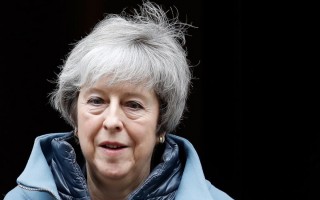British MPs reject Brexit deal for second time
British lawmakers on Tuesday rejected prime minister Theresa May’s Brexit deal for a second time, plunging Britain into complete uncertainty with just over two weeks to go until its scheduled date of departure from the European Union.
Parliament voted against the deal by 391 votes to 242, reported Agence France-Presse.
British opposition leader Jeremy Corbyn on Tuesday declared the Brexit deal ‘dead’ after it was voted down by a massive margin of lawmakers, and called on the government to adopt his proposals for a softer Brexit.
‘Their deal, their proposal, the one the prime minister's put is clearly dead,’ the Labour Party leader told parliament.
Reuters reports: The EU Brexit negotiator Michel Barnier ruled out doing more to help Britain reach a deal on an orderly withdrawal from the bloc, saying after British lawmakers rejected Brussels’ offer that the impasse could only be solved in Britain.
‘The EU has done everything it can to help get the Withdrawal Agreement over the line,’ Barnier tweeted. ‘The impasse can only be solved in the UK. Our “no-deal” preparations are now more important than ever before.’
Earlier, Theresa May battled to win support for her plans for an orderly Brexit on Tuesday, urging sceptical Conservative Party members to vote for her deal or risk not leaving the European Union at all.
Hours before a vote on the deal in parliament, May had failed to win over the main Brexit faction in her own party, while Northern Ireland’s Democratic Unionist Party, which props up her minority government, said it would vote against her.
Nonetheless, May defended her plan as a good deal compared to a series of unattractive alternatives.
‘If this vote is not passed tonight, if this deal is not passed, then Brexit could be lost,’ a hoarse-voiced May told lawmakers in the House of Commons.
In a last-ditch bid to save her Brexit plan days before the United Kingdom is due to leave, May rushed to Strasbourg on Monday to agree legally binding assurances with European Commission President Jean-Claude Juncker.
But Britain’s attorney general, Geoffrey Cox, dealt a blow to May’s plans, saying the assurances she had been given still meant the United kingdom could be locked in the bloc’s orbit after Brexit, the most controversial issue for Brexit-supporting lawmakers.
‘The legal risk remains unchanged,’ Cox said. ‘However, the matter of law affecting withdrawal can only inform what is essentially a political decision that each of us must make.’
Sterling fell as much as 2 cents on Cox’s advice, which was seen as reducing the chance that May’s deal will be approved by parliament. It was trading at $1.3129 at 15:00 GMT.
British lawmakers, who on January 15 voted 432-202 against May’s deal, will vote at 19:00 GMT. The main pro-Brexit faction in May’s party, the European Research Group, said it did not recommend voting for her deal.
The main sticking point is the so-called Irish border backstop, an insurance policy aimed at avoiding controls on the border between the British province of Northern Ireland and EU-member Ireland after Brexit.
Brexit-supporting lawmakers expressed suspicion at the haste of May’s last-minute assurances and suggested a delay to allow sufficient analysis of them and Cox’s advice.
‘I am very, very suspicious and concerned about the time scale,’ Conservative lawmaker Andrew Bridgen said. The ink isn’t even dry on the agreement... And we’ve got to vote on it today.’
Nigel Dodds, the DUP’s parliamentary leader, said the assurances would still trap the United Kingdom in the EU’s orbit.
For its part, the EU fears that if there is no backstop, an open border between the United Kingdom and Ireland will amount to an open door into the EU.
If lawmakers vote down May’s deal again, they will be given a vote on Wednesday on leaving without a deal, for which there is little support in parliament. If they turn down that option they will vote on Thursday on delaying Brexit. May said there was no guarantee the EU would agree to a delay.
May had announced three documents - a joint instrument, a joint statement and a unilateral declaration - which she said were aimed at addressing the Irish backstop, the most contentious part of the divorce deal she agreed with the EU in November.
She said the assurances created an arbitration channel for any disputes on the backstop, ‘entrenches in legally-binding form’ existing commitments that it will be temporary and binds the UK and EU to starting work on replacing the backstop with other arrangements by December 2020.
In essence, the assurances give the United Kingdom a possible path out of the backstop through arbitration and underscore the EU’s repeated pledges that it does not want to trap the United Kingdom in the backstop.
The European Research Group said the verdict of its ‘Star Chamber’ set up to analyse the assurances was that they did not deliver legally binding changes to the Brexit deal or the Irish backstop and did not provide an exit mechanism over which Britain had control.
‘In the light of our own legal analysis and others we do not recommend accepting the government’s motion today,’ William Cash, a senior pro-Brexit Conservative Party lawmaker said.
After two-and-a-half years of haggling since the 2016 Brexit referendum, Juncker cautioned this was Britain’s last chance. ‘It is this deal or Brexit might not happen at all,’ he said.
News Courtesy: www.newagebd.net











